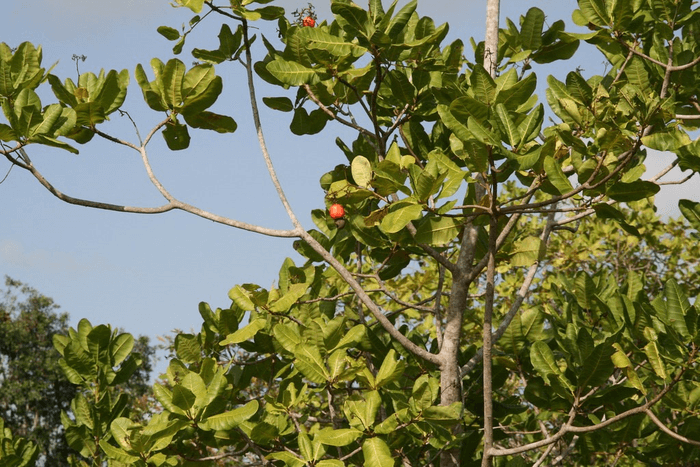From its leaves and bark to the seed kernels, almost every part of the cashew tree has an antidiarrheal effect yet no one really understands why. Now, new research from Nigeria can explain what makes the common cashew tree a valuable remedy for stopping diarrhea.
For many people living in first world countries diarrhea is a temporary and upsetting side effect from poorly made food. But without the proper medicine, diarrhea is life-threatening and is a major cause behind infant death. Beyond food intolerance, diarrhea is produced after microbial infections, drugs, and intestinal disorders.
“Diarrhea results from increased smooth muscle activity of the intestine, which is typically controlled by three neurophysiological pathways, dopaminergic, cholinergic, and serotonergic,” explains Dr. Kayode E. Adewole from the University of Medical Sciences, Nigeria in a press release. “Therefore, our experimental approach was to artificially stimulate gastric motility through each of these pathways and then see which of these were inhibited by the cashew stem bark extract. Our experiments were divided into two parts, in vivo, conducted in live mice, and in vitro, conducted on intestinal cells.”
The researchers used gastrointestinal motility-inducing drugs including one to block dopamine, another to produce more acetylcholine, and one to stimulate serotonin receptors to separate groups of mice. Another three groups of mice were given cashew stem bark extract before receiving the same medications.
Results showed the ethyl acetate fraction (AoEF) of the cashew bark extract helped the most in stopping the cholinergic pathway from causing diarrhea. However, it did not affect the other two pathways suggesting that cashew trees stop diarrhea by preventing the activation of the cholinergic pathway.
Another set of experiments using strips from the intestines of guinea pigs found that AoEF relaxed the intestines — even if they were aggravated from the activation of histamine, serotonin, and acetylcholine.
Using gas chromatography-mass spectroscopy to separate the various compounds in the cashew bark extract, the researchers found 24 components involved in making AoEF. Of the 24, ocetadecanoic acid 2-ethyl ester had the greatest strength towards binding with an acetylcholine receptor.
“CHRM3 is a receptor involved in cholinergic signaling in smooth muscle tissues of the gastrointestinal tract, and is involved in the pathogenesis of diarrhea,” Dr. Adewole says. “So, we concluded that AoEF relaxed and reduced gastrointestinal motility by blocking the muscarinic (or cholinergic) receptors responsible for the same.”
The study is published in the Journal of Journal of Pharmaceutical Analysis.
